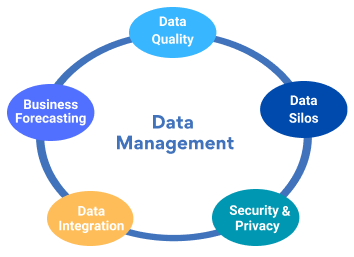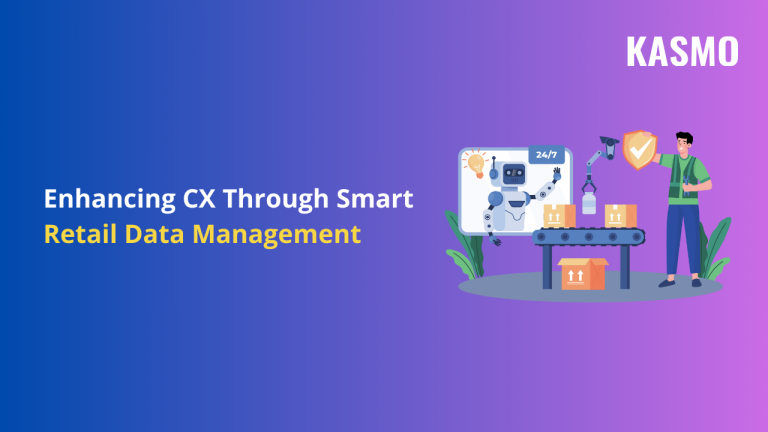Modern customers value the shopping experience over buying. A positive consumer experience leads to higher satisfaction and drives retail success. According to a Salesforce customer report, “80% of consumers say the experience a company provides is as important as its products.” This indicates that retailers must prioritize providing a superior customer experience to differentiate themselves in a crowded marketplace and establish themselves as a go-to brand for consumers.
To deliver excellent customer service, data is all you need. Retail businesses collect huge volumes of data covering customer preferences, purchases, demographics, and a lot more. This data needs effective management to unlock potential benefits and drive success. In this blog, we define retail data management, its importance, key challenges, and how Salesforce solutions help in delivering personalized and excellent customer service.
What is Retail Data Management?
Retail data management refers to the process of consolidating data regarding a retailer’s customers in a single accessible platform. The process includes collecting, storing, organizing, and analyzing personal data. The data includes basic customer information like gender, age, name, address, etc. Different types of data in the retail industry are:
- Customer data – demographics, purchase patterns, loyalty, and reviews.
- Market data – pricing, product line, market size, and shares.
- Transactional data – product purchased, returns, shipping, payment method.
- Engagement data – website activities, social media engagement, Mobile App, etc.
This customer information helps businesses gain important and hidden consumer insights to strategically plan, while providing a better experience that entices loyalty and increases conversion. In addition to offering personalized customer recommendations, managing and operationalizing data and retail analytics helps retailers to improve decision-making, manage supply chain, and increase sales.
Importance of Data Management in Retail
Data is the key aspect of today’s retail industry. It helps from customer service and marketing to decision-making and optimizing operations. Here’s the effective role of data in retail:

Customer Experiences
Retail data enables businesses to analyze customer preferences for products, services, promotions, and shopping behavior, allowing them to create targeted offers and pricing adjustments in real-time. This customer-centric approach surprises your customer with personalized recommendations and increases the chance of revisiting and buying.
Sales Forecasting and Trendspotting
Retail data is collected to model their new future sales. This helps businesses to identify new market trends and get ahead of the competitive landscape.
Targeted Marketing
Retailers can create targeted retail marketing campaigns using customer data, helping to cater to specific customer groups. This efficiently drives more engagement and conversion rates.
Increased Revenue and Customer Loyalty
Personalized experiences, targeted marketing campaigns, and better customer service help retailers sell more products and significantly increase revenues. Happy customers are likely to return, and their increased brand loyalty and purchase behaviors will generate further sustainable growth.
Omnichannel Consistency
By collecting and utilizing data, retailers can create an integrated experience across all channels, in-store, online, and mobile. Omni-channel customer service strategies elevate the shopping experience and customer satisfaction.
Challenges in Retail Data Management
Despite its benefits, retailers often face multiple challenges in retail data management that impact the effective use of data for growth. Here are the key challenges you might face:

Data Quality
Data quality is the key component for providing an excellent customer experience in the retail industry. Teams face difficulty with poor, wrong, incomplete, or outdated data. This ends up in targeting the wrong customers, delays in responses, damaging customer trust and loyalty, and hindering overall customer service.
Data Silos
Customer data scattered across various departments lacks a unified customer journey view. Retail companies have data in disconnected systems, making it difficult to obtain a detailed overview of customer behavior and business performance.
Security and Privacy Concerns
Data breaches and privacy violations are the major concerns in retail data management. Retailers collect huge amounts of customer information, requiring higher safety measures. When data is compromised or threatened by privacy laws, it affects brand reputation and customer trust.
Data Integration
Retail data is often split between point-of-sale systems, e-commerce, and customer relationship management (CRM), making it difficult to bring the data into one view. Integration of legacy systems with modern analytics or CRM platforms is also challenging. This fragmentation impacts tailored support, customer issues, and ultimately impacts customer satisfaction.
Business Forecasting
Retailers need to have an understanding of sales data, market and customer trends, competitor strategies, etc., to anticipate future sales. Hence, with improper retail data management, businesses face challenges in demand forecasting, leading to further inefficiencies in overall performance.
How to Improve Customer Service Using Salesforce?
To improve the customer experience, retailers need to abandon legacy systems and use new technologies to meet modern customer expectations. A few strategies you can adopt are:
Use Generative AI
Modern customers look for exceptional customer service, and according to a Salesforce report, “47% of shoppers said they were willing to pay extra for better customer service.” Businesses can utilize AI capabilities in marketing, sales, and services. Retailers can achieve higher customer satisfaction using Salesforce Agentforce for Retail.
Agentforce is an agentic AI solution that helps retailers to resolve customer queries 24/7, optimizes marketing campaigns, and provides a more personalized customer experience. Using Einstein Service Replies, businesses can provide AI-generated replies on SMS, email, WhatsApp, etc. Thus, increase customer satisfaction by delivering consistent and personalized customer service.
Customer Feedback
The value of customer feedback is useful to know and elevate the overall shopping experience. Businesses can ask for simple feedback using easily accessible feedback forms, conducting a website survey, or sending thank-you emails. Most insights customers provide are openly shared on social sites, such as Facebook, Instagram, etc.
Salesforce has made the feedback process easy with Service Cloud and Feedback Management tools. They help retailers to easily collect, analyze, and refine changes according to customer feedback. Salesforce Service Cloud is a customer service and support platform aiming to deliver personalized, efficient, and quicker customer service.
Customer Feedback Management tools provide personalized support and enhance CSAT by providing retailers with a unified view of real-time customer feedback. These platforms can be used to create a survey on specific products or services and provide an AI-driven summary. This helps retailers to gain a broader perspective on customer needs, key trends, and strategies to improve customer experience.
Personalization Customer Experience in Retail
Personalization is the key differentiator for your business. As previous McKinsey research revealed, 71 percent of consumers expected companies to deliver personalized interactions, and 76 percent got frustrated when it didn’t happen. Tailored recommendations and exclusive offers create a personalized shopping experience that resonates with your audience, turning casual shoppers into loyal advocates.
Salesforce has set new standards with Retail Cloud Solutions, including mPOS systems, to deliver a personalized customer experience by connecting both online and in-store customer insights. With the Salesforce Customer 360 platform, retailers can have a detailed view of customers’ purchase history and preferences, which helps them personalize recommendations, target promotions, and increase overall customer experience.
Effective Marketing and Advertising
Customer satisfaction should be the central goal of businesses. Effective marketing can turn a simple shopping experience into a memorable one. So, using retail data makes it easy for marketers to specifically target a certain audience. This helps to develop personalized marketing strategies and campaigns based on individuals’ interests and may further result in a higher ROI.
Salesforce Marketing Cloud can be your best choice, from campaign automation to personalized messaging and target marketing. Marketing Cloud is a complete marketing platform using AI and smart analytics to promote email marketing, mobile, and advertising. These solutions are effective in driving higher customer engagement, building long-term customer relationships, and enhancing customer loyalty.
Consistent Customer Journey
Customers interact with businesses using different touchpoints, like in-store, online, and mobile apps, etc. So, providing an omnichannel experience has become essential. As many retailers are still relying on legacy systems that function both online and offline separately, this leads to poor customer experience.
Businesses using Salesforce Consumer Goods Cloud can seamlessly integrate both online and offline customer journeys. It can track iteration with different channels, tailor support and responses, and boost engagement. Thus, retailers using the Salesforce solution can build better omnichannel CX strategies to reach targeted customers and enhance customer satisfaction.
Conclusion
In the retail industry, meeting consumer expectations and providing a better customer experience is non-negotiable. This can be achieved through proper retail data management. It helps retailers collect, store, and analyze consumer data. Certain challenges like data quality, data silos, and security and privacy. Retailers should address them to deliver personalized recommendations, targeted offers, gain customer loyalty, and more.
With Salesforce CRM, retailers can make effective use of data to enhance customer relationships and experience. Implementing different features like Marketing Cloud, Retail Cloud, and Agentforce helps retail businesses automate campaigns, personalize CX, improve engagement, and deliver overall the best customer service.





